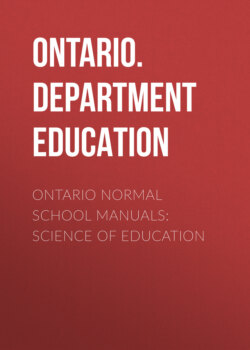Читать книгу Ontario Normal School Manuals: Science of Education - Ontario. Department of Education - Страница 30
На сайте Литреса книга снята с продажи.
OTHER EDUCATIVE AGENTS
ОглавлениеTable of Contents
The Church.—But notwithstanding the organization of the present school as a civic institution, it is to be noticed that the church still continues to act as an educative agent. In many communities, in fact, the church is still found to retain a large control of education even of a secular type. Even in communities where the church no longer exercises control over the school, she still does much, though in a more indirect way, to mould the thought and character of the community life; and is still the chief educational agent concerned in the direct attempt to enrich the religious experiences of the race.
The Home.—While much of the knowledge obtained by the child within his own home necessarily comes through self, or informal, education, yet in most homes the parent still performs in many ways the function of a teacher, both by giving special instruction to the child and by directing the formation of his habits. In certain forms of experience indeed, it is claimed by the school that the instruction should be given by the parent rather than by the teacher. In questions of morals and manners, the natural tie which unites child and parent will undoubtedly enable much of the necessary instruction to be given more effectively in the home. It is often claimed, in fact, that parents now leave too much to the school and the teacher in relation to the education of the child.
The Vocation.—Another agent which may directly control the experiences of the young is found in the various vocations to which they devote themselves. This phase of education was very important in the days of apprenticeship. One essential condition in the form of agreement was that the master should instruct the apprentice in the art, or craft, to which he was apprenticed. Owing to the introduction of machinery and the consequent more complex division of labour, this type of formal education has been largely eliminated. It may be noted in passing that it is through these changed conditions that night classes for mechanics, which are now being provided by our technical schools, have become an important factor in our educational system.
Other Educational Institutions.—Finally, many clubs, institutes, and societies attempt, in a more accidental way, to convey definite instruction, and therefore serve in a sense as educational institutions. Prominent among such institutions is the modern Public Library, which affords opportunity for independent study in practically every department of knowledge. Our Farmers' Institutes also attempt to convey definite instruction in connection with such subjects as dairying, horticulture, agriculture, etc. Many Women's Clubs seek to provide instruction for young women, both of a practical and also of a moral and religious character. Various societies of a scientific character have also done much to spread a knowledge of nature and her laws and are likewise to be classed as educational institutions. Such movements as these, while taking place without the limits of the school, may not unreasonably claim a certain recognition as educational factors in the community and should receive the sympathetic co-operation of the teacher.
